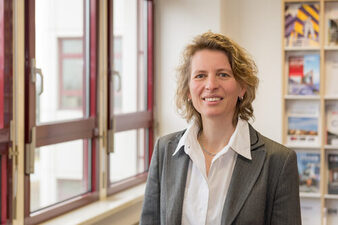Prof. Dr. Nicole Knuth from Fachhochschule Dortmund took part in a recent hearing with politicians from the German Bundestag as a scientific expert. In Berlin's Paul Löbe House, they exchanged views with young people and parents who have experience of residential care. A research study supported the concerns of those affected, and the findings were also presented at an expert discussion in the Family Affairs Committee.
"Home education is intended to promote the development of children and young people by combining everyday life with educational and therapeutic services," explains Nicole Knuth, referring to social legislation. "In hardly any other area does the state intervene so much in the everyday lives of families and take responsibility for the lives of young people by placing children, adolescents and young adults in residential groups outside their parental home." Residential care cannot always live up to this claim and, despite numerous efforts at reform, it is prone to abuse of power, exclusion and stigmatization.
"Listen to us"
Against this backdrop, the "Listen to us" hearing was organized by Parliamentary State Secretary Ekin Deligöz, Ulrike Bahr as Chair of the Committee for Family Affairs, Senior Citizens, Women and Youth and the International Association for Educational Assistance (IGfH) to discuss the necessary further development of residential care with young people, care leavers, parents with experience of group homes and politicians in the Bundestag. This format was made possible by the "Zukunftsforum Heimerziehung" project (funded by the Federal Ministry for Family Affairs, Senior Citizens, Women and Youth), for which Nicole Knuth contributed her research study.
Self-representation strengthened
"A key finding of the project is that the voices of young people and parents in residential care need to be heard and their self-representation needs to be strengthened," says the Dortmund professor. The study shows that parents usually experience the placement of their children as a profound crisis. "Parents' demands for their children to be placed close to home, which allows for personal contact, are understandable. The politicians involved also listened with great interest to the young people's demands for more participation in their residential groups and for a reduction in stigmatization, for example, and discussed concrete proposals for change," reports Nicole Knuth.
Constructive further development
At the end of the event, suggestions for further development were formulated, such as the intensive accompanying support of self-help organizations of all affected groups. Above all, however, it became clear how important the views of those affected are for the constructive further development of home education and how useful research support is in this sense.
Contact us
Do you have specific questions about the event or about home education in general?
Prof. Nicole Knuth, Dr.
- +49 231 91124911
You can find my office hours here: https://www.ilias.fh-dortmund.de/ilias/goto_ilias-fhdo_prtf_1369623_1783.html
You will automatically receive the link to the video conference as an appointment confirmation by e-mail.
Please send me the necessary documents 1-2 days before the appointment (please include your name, request and date of the appointment).

